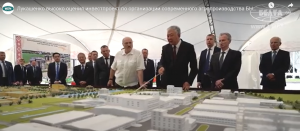A day after Kyrgyz President Sooronbay Jeenbekov congratulated Belarusian President Alexander Lukashenko on his re-election, the Kyrgyz Foreign Ministry handed the Belarusian Embassy a note of protest.
On August 10, Lukashenko paid a visit to the Belarusian National Biotechnological Corporation (BNBK). In an official video, he stands beside a man with a pointer explaining the layout of an agricultural investment project. The man holding the pointer is what raised eyebrows and tempers in Bishkek.
As Eurasianet’s Peter Leonard lays out in detail, the man appears to be Daniyar Usenov, a former Kyrgyz prime minister who was ousted in 2010, alongside the government of Kurmanbek Bakiyev. Usenov, like Bakiyev, ended up in Belarus but under a new name — Daniil Timurovich Uritsky.
Bakiyev and his extended network of cronies — who found soft landings in Belarus — have been a thorn in Kyrgyzstan-Belarus relations for the last decade.
Kyrgyzstan’s 2010 revolution was driven by a confluence of factors, but critically an economic crisis and the perception that the Bakiyev government was especially corrupt and nepotistic. After fleeing Kyrgyzstan, Bakiyev ended up in Belarus. The former Kyrgyz president allegedly obtained Belarusian citizenship.
Back in Kyrgyzstan, Bakiyev, his son Maksim, his brother Janysh, and others — like Usenov, a former mayor of Bishkek and at the time of the 2010 revolution, the prime minister — over the years have been tried and convicted in absentia. Bishkek has requested extraditions multiple times, always rebuffed by Minsk.
In February 2015, then-Kyrgyz President Almazbek Atambayev, never one to mince words, called the Bakiyev family “monsters” and “cannibalistic” killers according to an RFE/RL report at the time. Atambayev said Belarus had “given shelter to villains.” Atambayev’s comments elicited a sharp retort from Belarus.
While the Bakiyev et al. issue has remained a point of tension, Kyrgyzstan and Belarus — both former Soviet states — travel in the same diplomatic and geopolitical circles revolving around Russia. They both joined Russia’s Eurasian Economic Union (EAEU) and in October 2015 Kyrgyzstan dispatched an ambassador to Minsk, after having recalled its previous ambassador in 2012.
Lukashenko’s “election” last weekend sparked widespread protests and mass arrests. His main opponent, Svetlana Tikhanovskaya, disappeared for several hours and then fled the country for Lithuania, where she’d sent her children before election day. A video surfaced of her asking supporters to stop protesting but she appears to be reading from a script, leading to allegations that the statement was forced.
As criticism from democratic countries rains down on Belarus, and protests over the election continue, it’s notable that Kyrgyzstan — which ousted its first two presidents via revolution — stood among those congratulating Lukashenko. That one of those ousted presidents and his allies found safe harbor in Belarus, and that Lukashenko apparently stands around chatting with them, adds insult to injury. Of course, there are greater geopolitical currents swaying Kyrgyzstan’s decisions, but this particular paradox sounds a sour note.

































